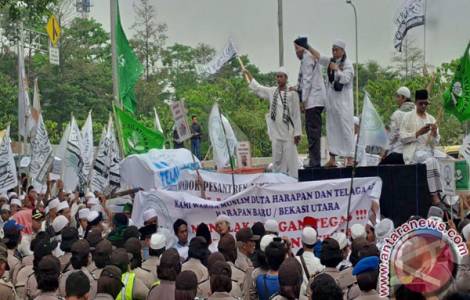
Antara
Jakarta (Agenzia Fides) - For many Indonesians, yesterday was a sad day. Defeated in the run-off in the elections for the seat of governor in Jakarta, Basuki Tjahaja Purnama, a Protestant Christian of Chinese ethnicity, known as "Ahok", was found guilty and sentenced to two years in prison for blasphemy by a court in Jakarta.
Interviewed by Agenzia Fides, Jesuit Franz Magnis-Suseno, a well-known scholar and university professor, who has been in Indonesia for 56 years said: "This is an unfair sentence, endorsed by judges under strong Islamist pressure". Political analyst and director of the Jesuit school of philosophy in Jakarta, Magnis-Suseno, points out the phenomenon of "Islamic populism". "Extremists will try to continue their campaign in view of the 2019 presidential election to beat President Joko Widodo (known as Jokowi). They will try to highlight that Jokowi is not a true Muslim".
Another even more worrying scenario adds the German Jesuit is the fact that: "For more than a year, a silent coalition between former generals and Islamic militants is developing. An increase in disorder and social chaos could "force" the military to assume power, with Islamist support. It should be noted that the old generals have never accepted the democratic reform implemented after the fall of dictator Suharto".
According to Magnis, there are two lessons to be learned today: "The first is that Islamic extremism has been underestimated by the great Muslim organizations of civil society, Muhammadiyah and Nahdlatul Ulama (NU). In the last six months, behind the extremist leader Habib Rizieq Shihab young followers of the NU and especially of Muhammadiyah have also enthusiastically gathered, so it is possible that there is already a change in balance in Indonesian Islam. Radicals proclaim themselves as representatives of all Indonesian Islam, beating on Islamic identity and taking a central role on the political scene".
The second lesson concerns the Christian minority: "Ahok's words and his presence as a candidate", explains Magnis-Suseno, "represented a provocation right from the beginning. Indonesia is still not ready for a Christian to become a national leader, especially a Christian of Chinese origin (there are anti-Chinese feelings in society), and then an arrogant and presumptuous person like Ahok, "who unnecessarily instigated the radicals, with his speech on the Koran. In any case, the Jesuit concludes, "Christian citizens have offered Ahok peaceful support, in sign of solidarity they accompanied him to the jail, singing the national anthem and launching this message: the baptized do not want to let Indonesia fall into the hands of fanatics and extremists". (PP-PA) (Agenzia Fides 10/5/2017)